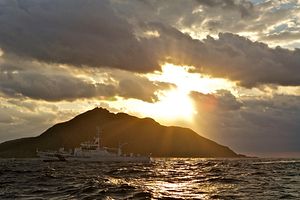U.S. Defense Secretary James Mattis will arrive in Tokyo later this week for his inaugural trip abroad to Asia. His stop in Tokyo will come after a brief two-day visit to Seoul. The choice of these two Northeast Asian allies was no accident: Mattis has been tasked with offering reassurance to these two major treaty allies after U.S. President Donald Trump disparaged aspects of the alliances during his campaign for the presidency.
In Japan, Mattis will meet his Japanese counterpart Tomomi Inada, Japan’s minister of defense. He is expected to reiterate the United States’ treaty commitments to Japan and sow a degree of continuity for the alliance from the legacy left over by the Obama administration, which included an important revision of the U.S.-Japan defense guidelines, which were finalized in 2015.
Most interestingly, a report in the Yomiuri Shimbun hints that Mattis may go the extra mile on reassurance and offer the first high-level verbal reassurance since Obama’s state visit to Japan in 2014 that the U.S.-Japan alliance covers the disputed Senkaku/Diaoyu Islands in the East China Sea. The islands are administered by Tokyo, but claimed by Beijing.
As I wrote in 2014, Obama’s acknowledgement that Article V of the treaty covered the Senkaku Islands was an important statement. Between 2012, when Japan controversially nationalized the Senkakus along with other East China Sea islands to prevent their acquisition by Shintaro Ishihara, Tokyo’s hypernationalist former governor, and the conclusion of the China-Japan “four point consensus” in late-2014, tensions between China and Japan were exceptionally high.
During that time, Japanese jets were scrambling at record levels in the East China Sea, Chinese People’s Liberation Army-Navy warships were regularly entering disputed waters, and the prospect of an armed skirmish breaking out between the two East Asian giants was great. Obama, by clarifying that any act of Chinese aggression in the East China Sea against the Senkakus would trigger the activation of U.S. mutual defense obligations, helped both reassure Tokyo and deter Beijing.
If Mattis’ repeats this move, it’ll largely be symbolic and for Tokyo’s benefit. Japan needs to hear that despite Donald Trump’s disparagement of the alliance during the campaign, nothing has fundamentally changed about how and when the United States would fight for Japan. What’s interesting, however, is how Mattis’ restatement of the Senkaku issue would go over in China.
As the presidential transition in the United States made amply clear, there are multiple pressure points between the United States and China that the Trump administration could either inadvertently or intentionally push against, causing a deterioration in U.S.-China ties. Beijing has refrained from sharply criticizing the Trump administration to date, with the exception of a pointed pushback against the new White House press secretary’s uninformed comments on the South China Sea disputes.
Mentioning the Senkakus in Tokyo would draw a reaction from China. In 2014, though the Chinese foreign ministry did not react publicly, Chinese state media called the decision “myopic.” Since then, China has continued to test Japan’s limits in the East China Sea, intensifying its naval and aerial activity again in summer 2016. Beijing has additionally set up oil exploration rigs across the equidistance line in the East China Sea, which Tokyo alleges is in violation of a 2008 bilateral agreement on joint resource development.
In the end, Mattis really should mention the Senkakus while he’s in Japan. Setting aside the unique challenges for reassuring alliances under a Trump presidency, it’s always good practice for new governments to restate continuity with a previous administration. It’s unlikely that China’s reaction will be disproportionate; worst case, after Mattis leaves, Beijing may resume its low-level provocations in the East China Sea.
Mattis is expected to outline the Article V commitments, including on the Senkakus, on Saturday. We’ll see how far he’ll be willing to go.
































